Combating Eco-Emotions; Notes from a Senior Environmental Studies Student
It’s April! We are in the midst of Earth Month and Earth Week! This month’s blog post is a little different from the other ones I’ve created and sadly, it’ll be one of my last ones. If you’ve been following along, thank you, and I hope you enjoy!
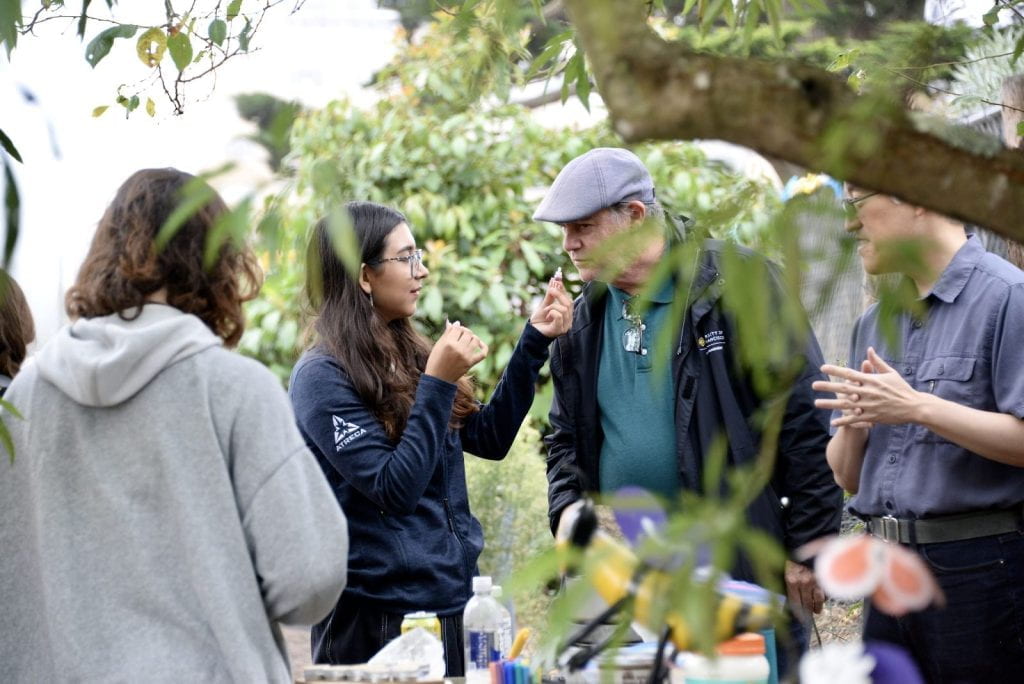
Making beeswax lip balm in the USF Community Garden
For a little more context, I am a senior in Environmental Studies here at USF, and though I love everything I’ve had the fortune to study and learn about, this doesn’t come without its qualms. In this major, most of my days include reading some of the most devastating environmental traumas the world faces–one paper after another. This coupled with personal environmental justice issues can lead to big, complicated feelings.
In my own community, lithium extraction–among other things–is a threat to public health. At first enraged and then disheartened at the prospect of losing those I love to this imminent threat- I came to the conclusion that in honor of Earth Month and Earth Day, I wanted to grapple with these emotions and give some coping mechanisms that took me a couple of years in this major and twenty some in lived experiences for those that may need them.
Although we now understand that individual action alone is not enough to combat this ongoing crisis, find comfort in the power that comes with these small things that you can incorporate in your everyday life with some stats on how helpful that may actually be, and look into these support resources on and off campus that can help you.
Unfortunately, environmental degradation impacts us all. Vulnerable communities are disproportionately impacted by environmental damages and oncoming climate change. In response to this, some people have described their emotional reaction as ‘eco-fury,’ which is exactly what it sounds like: it’s a deep-rooted emotional response to environmental injustice and the degradation of the Earth.
Self-care is difficult sometimes. It’s writing out or drawing hard feelings. It’s also allowing yourself to grieve the loss of people you knew and of spaces, which you used to love and still do, that have degraded. It can include being frustrated because policymaking isn’t as fast as it needs to be or in the direction you want it to. It can be the concern about different species that aren’t doing as well as they used to–even if everyone around you is excited that they still exist. It can be sitting in a parking lot that used to be a natural space and being a little upset about it. Jot it down. It certainly won’t hurt anyone to write it out, but holding onto that can hurt you.
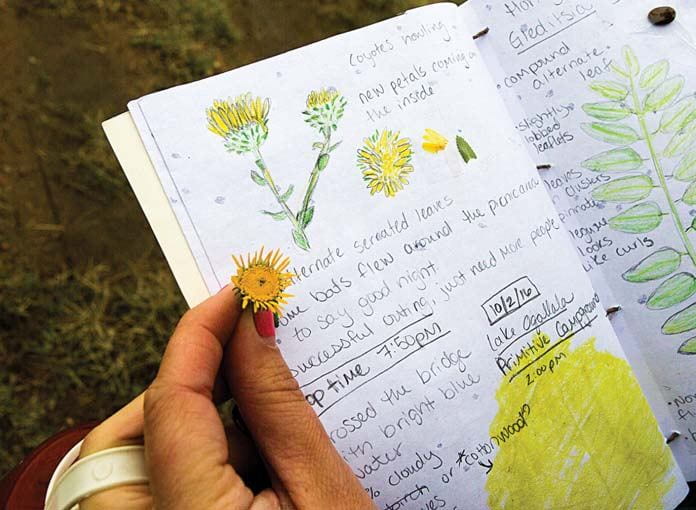
Nature journal
There is something called nature journaling, which allows you to have a space to hone in on your environment and take note of the space you’re in. You can sketch some of the plants you are around, talk about your feelings, and describe the different species you find yourself surrounded by. With enough practice, you’ll find yourself becoming more observant and in tune with the nature around you. This is extremely important while living in the city. You might find some comfort in plant-identifying books (available in the library!) or apps to identify plants on your way to different places (Seek is very easy to use). Soon you’ll recognize plants the same way you can recognize the logos of different brands.
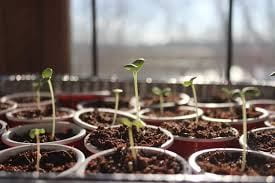
Planted seeds sprouting
My nature immersion class taught me something called a sit-spot. You might find some comfort in it. This exercise is about consistency; pick a spot you love, any spot outside that you find some sort of comfort in. Try to visit this space regularly and take note of changes. What kinds of birds frequent this space in the winter? The summer? What plants are here–when? How does this space change with time? It’s your spot, and a space you set aside to be yourself in.
Grow plants. No, I mean it. It’s not as hard as it’s made out to be. Plants want to grow. A small seed, some dirt and water–that is all it takes. In fact, air plants don’t even need soil. Plants are designed to grow; this is the only thing they do. Surround your space with some indoor plants if you like the way they make you feel. We have a seed library on campus that provides you with seeds for local native plants, so take full advantage of this if you’d like.
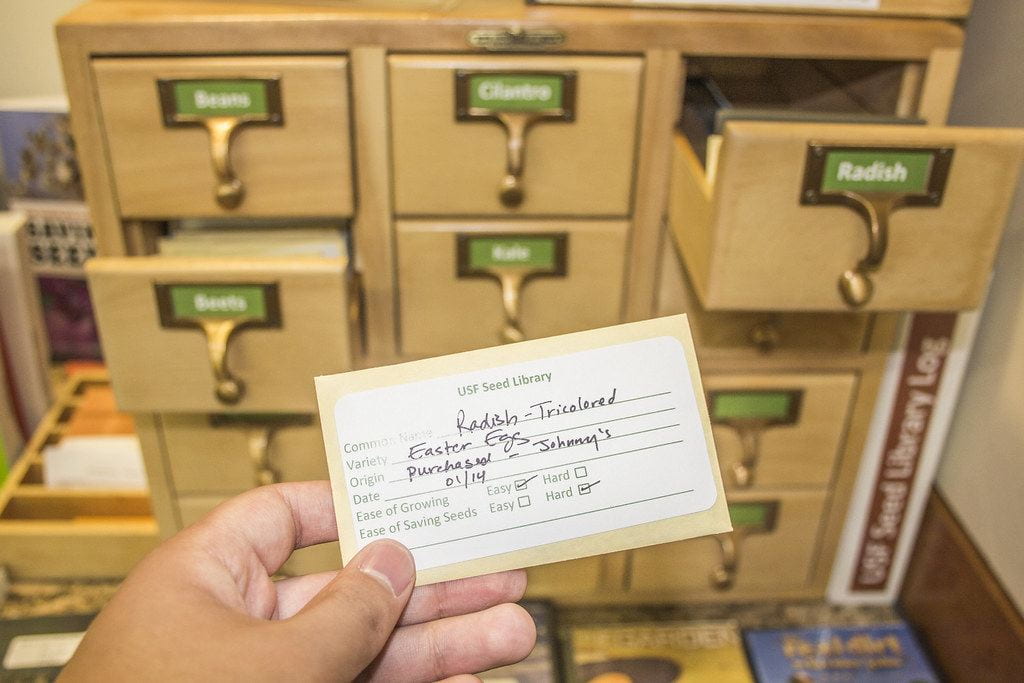
USF seed library
This one may come as no surprise, but it’s worth saying anyway: spend time outside. Studies show that insufficient levels of vitamin D impact your mental health, and this vitamin is acquired from sunshine and being outside. Our bodies are designed to spend time outside; we haven’t adapted to the lifestyle a lot of us live. We are not meant to be in front of screens and sitting for long periods of time. We are meant to be outside, so take a couple of minutes to be outside mindfully. Set at least fifteen minutes aside each day to be outside intentionally. Acknowledge the weather. Is it cold? That’s okay. Is it warm? That’s okay. Allow yourself to experience it fully for a moment.
Rebel against consumption in your own way. My friends did something at our house that completely rewired my perception of what rebellion and what consumption has to look like. We all took clothing pieces from our closets that we liked but were not getting enough use out of and traded them with one another. We traded jewelry, clothes, and other trinkets and had dinner together. It was a wholesome and beautiful experience that was so much more fulfilling compared to the shopping we’ve been socially prescribed to participate in.
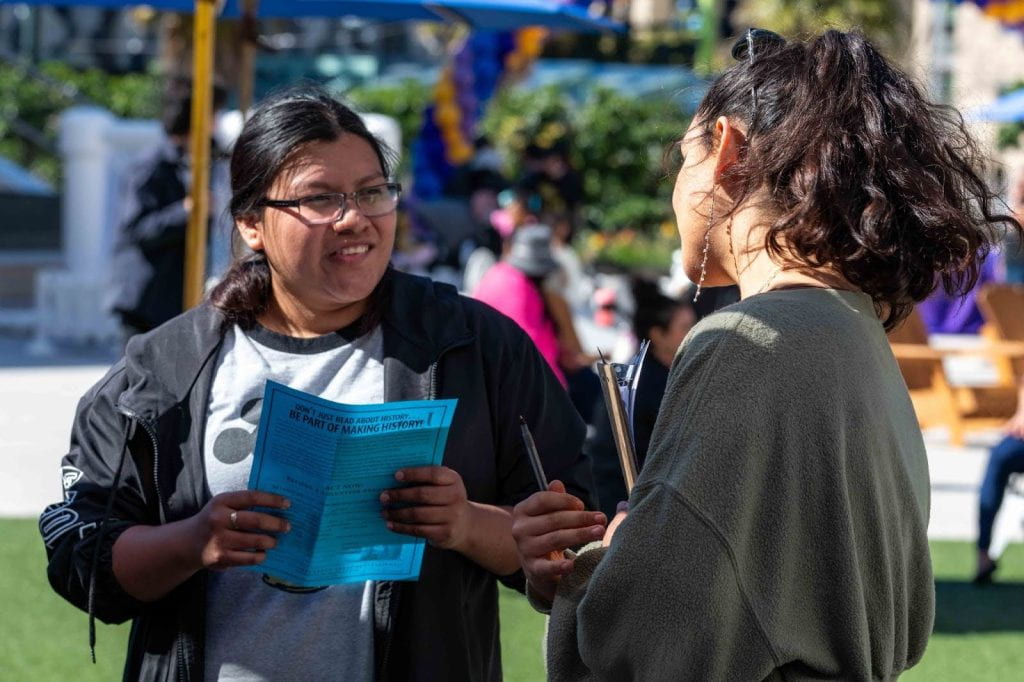
Get involved in local organizations
If you find that the methods described above are simply not enough, immerse yourself in environmental initiatives in your community. I intern at Coalition of Concerned Legal Professionals, and through this experience I learned that in the Bay Area, unfortunately, we have a history of pollution and environmental racism–although I won’t scar anyone with details in this blog, especially since the purpose is to be uplifting. But if you are a fellow student, I suggest getting involved! This leads to one of the coping mechanisms I wanted to describe: being involved. USF offers so many on-campus environmental organizations that you can join and lead. Take some time to figure out what it is you are passionate about with the environment. Want to save the bees? Cool! There’s an organization for that. Want to focus on urban greening? There’s an organization for that too! Think about where you want to spend your time, and do this as a form of self care.
To reiterate, take time and space to process these hard emotions and know that it’s okay to have them. Try keeping a nature journal where you set aside a place to write these things down and release them. You might find some comfort in doing a sit-spot activity. Plant-identification is also very important to feeling connected to the environment you are in. Lastly, spend time outside and become involved in local environmental movements and organizations.


